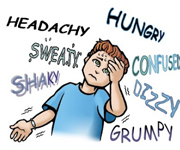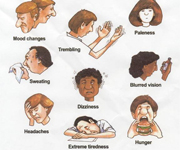Hypoglycemia as a Health dilemma

Hypoglycaemia is a health problem due to low level of blood sugar in an individual. Research indicates that this syndrome normally occurs as a result of the amount of glucose in the blood being less than 60mg/Dl.
Basically, Hypoglycemia is a clinical disorder with varied causes in which low serum (or plasma) glucose concentrations lead to symptoms of sympathoadrenal activation and neuroglycopenia.
Such type of health conditions arises in adults who have diabetes mellitus because of lack of insulin and as a result of ineffective insulin action.
Hypoglycemia is caused by a number of factors which include the individual carrying out overmedication by using either insulin or even the existing antidiabetic pills, apart from the overmedication. It has been also found that the use of particular medications may also lead to a low blood sugar in an individual.
Other cause of this illness is the excessive use of alcohol by the person. It also occurs in individuals who miss and skip meals. When a person who take insulin in the body to control the amount of glucose in their blood, skip meals without changing the dosage of the insulin is more prone to develop hypoglycemia. While those who take a lot of insulin or overdose themselves with their oral medications, are also likely to develop Hypoglycaemia. The other cause of this condition is the insulin tumour in the body of an individual which are commonly referred to as the insulinomas. This is normally caused by the high level of the insulin in the blood. In many cases,
it is found that the body normally regulates the amount of glucose in the blood which is regarded to be the main source of energy to most parts of the body such as the brain, the muscles among other parts. Therefore this insulin is normally produced in the pancreas which contains beta cells and alpha cells, considered as special cells. Since they produce insulin and glucagons, therefore insulin plays a major role in enabling the glucose absorption in the blood which allows the insulin to be stored in the liver and to be used in the body by other cells.
Symptoms
 Research indicates that hypoglycaemia usually activates various
hormones in the body. One of them is the epinephrine which
secretes from the Central Nervous System. Most symptoms of this
condition are associated with the nervous system of an
individual. Common symptoms hypoglycaemia is palpitation,
sweating, hunger, trembling and anxiety. Anxiety is regarded as
a psychological disorder that makes a person some times to feel
anxious with no noticeable cause. Medical practitioners also
argue that such a disorder sometimes is accompanied by
uncomfortable feelings of which it is difficult to stop such
feelings once it occurs. Alarming symptoms of low blood sugar
are extreme hunger (some children complain of a gnawing
stomachache or "hunger pain"), shakiness or tremors, rapid heart
rate, cold sweat, a pale, gray skin color, headache, moodiness
or crankiness/irritability, drowsiness, weakness, dizziness,
unsteadiness/staggering when walking, blurred or double vision,
confusion, seizures or convulsions and loss of consciousness. In
addition, children who have nocturnal hypoglycemia may
experience bouts of crying or nightmares, night sweats (with
damp sheets and/or pajamas), or wake up groggy or with a
headache.
Research indicates that hypoglycaemia usually activates various
hormones in the body. One of them is the epinephrine which
secretes from the Central Nervous System. Most symptoms of this
condition are associated with the nervous system of an
individual. Common symptoms hypoglycaemia is palpitation,
sweating, hunger, trembling and anxiety. Anxiety is regarded as
a psychological disorder that makes a person some times to feel
anxious with no noticeable cause. Medical practitioners also
argue that such a disorder sometimes is accompanied by
uncomfortable feelings of which it is difficult to stop such
feelings once it occurs. Alarming symptoms of low blood sugar
are extreme hunger (some children complain of a gnawing
stomachache or "hunger pain"), shakiness or tremors, rapid heart
rate, cold sweat, a pale, gray skin color, headache, moodiness
or crankiness/irritability, drowsiness, weakness, dizziness,
unsteadiness/staggering when walking, blurred or double vision,
confusion, seizures or convulsions and loss of consciousness. In
addition, children who have nocturnal hypoglycemia may
experience bouts of crying or nightmares, night sweats (with
damp sheets and/or pajamas), or wake up groggy or with a
headache.
Medical specialists always recommend that if a person is suffering from hypoglycaemia, he must make efforts to increase the blood sugar in a body. Otherwise, patients will most likely face a numerous complications such as his brain will be hyperexcitable and it may eventually lead to convulsions. Attendants of the patient are advised to give sugar when the symptoms for the condition appear. But in many instances when the blood sugar is already high this measure may not be effective.
When the patient is active, he may be given orange juice which help in balancing the blood sugar. Glucose monitoring is another way to look after patients of hypoglycaemia. Patients can check their own blood sugar in their own homes. This monitoring requires an individual to get a drop of blood from his finger, after that he can spread the blood to a strip paper which is placed to a glucometer that carries out an analysis of the blood. A blood sugar level is tested with a glucose meter, which is a computerized device that measures and displays the amount of glucose in a blood sample. If blood sugar is high, it is important to treat the patient for hypoglycemia immediately to prevent seriousness of disease.
It is difficult to diagnose hypoglycemic disorder only on the basis of a low serum glucose concentration, unless it is very low. Normal reference range of fasting serum glucose value is 70 to 100 mg/dL (3.9 to 5.6 mmol/L). If any patient with a serum glucose concentration less than 60 mg/dL (3.3 mmol/L), he should be assumed of having a hypoglycemic disorder. He must be further evaluated if the value is less than 50 mg/dL (2.8 mmol/L).Although low blood glucose values measured using reflectance meters suggest the presence of hypoglycemia, but these methods are not trustworthy when the measured values are low. Doctors usually state that if a patient who has low blood glucose value measured by a meter but does not show any symptoms of hypoglycemia, he does not need further evaluation.
If patient repeatedly have low values, then he needs further evaluation. A low serum glucose concentration in the absence of symptoms of hypoglycemia suggests the possibility of artifactual hypoglycemia. Doctors use Whipple's triad, a diagnostic approach to diagnose hypoglycemia. Is diagnosed low blood glucose when patient show the signs and symptoms. Doctor will draw a sample of blood to be analyzed in the laboratory.
Major Complications If person ignore the symptoms of hypoglycemia too long, he may lose consciousness because brain of a person needs glucose to function. If a person identifies the signs and symptoms of hypoglycemia at early stage but do not visit doctors for further evaluation and treatment, hypoglycemia can lead to seizures, loss of consciousness and even death. Diabetic patient must be careful not to over treat their low blood sugar. If they proceed, it may cause blood sugar level to rise too high. This is very dangerous and may cause damage to nerves, blood vessels and various organs.
Treatment
 There are two methods for treating hypoglycemia. First of all,
patient needs immediate initial treatment to raise his blood
sugar level. The initial treatment depends on the symptoms of
patient. Early symptoms can usually be treated by consuming
sugar, such as eating candy, drinking fruit juice or taking
glucose tablets to raise blood sugar level. If symptoms of
patient are more severe, impairing his ability to take sugar by
mouth, he may need intravenous glucose or an injection of
glucagon.
There are two methods for treating hypoglycemia. First of all,
patient needs immediate initial treatment to raise his blood
sugar level. The initial treatment depends on the symptoms of
patient. Early symptoms can usually be treated by consuming
sugar, such as eating candy, drinking fruit juice or taking
glucose tablets to raise blood sugar level. If symptoms of
patient are more severe, impairing his ability to take sugar by
mouth, he may need intravenous glucose or an injection of
glucagon.
If patient is prone to severe episodes of hypoglycemia, he must rush to doctor if a home glucagon kit might be appropriate for him. To prevent recurrent hypoglycemia, doctor must identify the underlying condition and treat it. Depending on the fundamental cause, treatment is given. If a medication is the cause of hypoglycemia, doctor will suggest to chang the medication or adjusting the dosage.
Prevention If patient is under grip of diabetes, he must carefully follow the diabetes management plan which is advised by doctor. Persons, who are not diabetic and have recurring episodes of hypoglycemia, must eat frequent small meals throughout the day to maintain their normal blood sugar levels. It is better to know the root causes low blood sugar levels. It can help decrease the frequency with which low blood sugar levels occur and help prevent severe symptoms.
There are some guidelines through which a person can avoid
low blood sugar levels:
-Person must take correct dose and type of insulin at the right
time in the appropriate injection site.
-Check blood sugar regularly and whenever necessary to confirm
that symptoms are being caused by hypoglycemia.
-Make sure that patient doesn't take baths or hot showers right
after an insulin shot.
-Check blood glucose levels of patient before and during
exercise and make sure he or she eats snacks as needed to keep
or bring blood sugar levels into target range.
-Confirm that patient follows the suggested timing of meals,
injections, and exercise, based on the diabetes management plan.
-Make sure that patient carries something containing sugar with
him or her at all times and takes it right away if he or she has
symptoms of low blood sugar.
If preventive measures are taken then severe symptoms of the disease can be controlled.
Articles on Health
- Laparoscopic Surgery Advantages
- Laparoscopic Surgery History
- Laparoscopic surgery Procedures
- Limitations of traditional laparoscopic surgery
- New technologies for advance laparoscopic surgery
- Non-Robotic Laparoscopic Surgery
- Robotic Laparoscopic Surgery
- Causes and remedy for dark circles in females

- Harmful impact of mobile phone on unborn baby

- Maternal health care tips

- Rheumatoid Arthritis is Most Widespread in Female
- Periodontal ailment during Pregnancy
- Anemia is prevalent in Women
- Effect of Cell phone tower radiation on human health

- Current health scenario india
- Government health policies india
- Medical facilities india
- Hospital infrastructure india
- Shortage of Medical Professionals in India
- Quality standards indian hospitals
- Indian states health statistics
- Medical expenses india
- Hospitals in Ahmedabad
- Hospitals in Bangalore
- Hospitals in Chennai
- Hospitals in Cochin
- Hospitals in Delhi
- Hospitals in Hyderabad
- Hospitals in Kolkata
- Hospitals in Mumbai
- Hospitals in Pune
- Hospitals in Coimbatore
- Hospitals in Kochi
- Orthopaedics Hospitals in India
- Diabetology Hospitals in India
- Cardiology Hospitals in India
- Infertility Hospitals in India
- Neurology Hospitals in India
- Paediatrics Hospitals in India
- Nephrology Hospitals in India
- Oncology Hospitals in India
- Antiaging foods to improve skin

- Tips for Maintaining healthy bones
- Guidelines for preventing heart disease
- Tips to reduce eye strain while working on computer
- Mental health problems among elderly people
- Health problem of piles

- Health advices for air travel

- Dealing with Allergies
- Tips for Eyes Care
- Care for Crystal Clear Skin
- Tips For Healthy Hair
- Healthy Living is The Absolute Measure of Happiness
- Let Fragrance Rule Your Summer
- Most common vestibular disorder

- Osteoporosis Risk Factors
- Dengue

- Endocrine disorder

- Causes of liver damage
- Dry eye syndrome
- Kidney Stones
- Conjunctivitis: Irritating eye disease
- Anxiety Disorder
- Causes of Brain Damage
- Hepititis B
- Knowledge of Osteoarthritis
- Mental Illness
- Back Pain
- Sugar Addiction
- Diet Control Plans
- General Motors Diet Plan
- No Carbohydrate Diet
- One day Diet Plans
- Seven day diet Plans
- Vegetarian Diet
- Food for Health
- Genetically Modified Foods
- Healing Effects Of Fruits
- Vegetables That Heal
- Healing Effects Of Spices and Herbs
- Test your Stress Level
- Mantras for Relaxation & Stress free life
- Take walk For a healthy body and mind
- Squint is frequently observed in Children
- Consult-Doctor
- Free Handy Health Advice